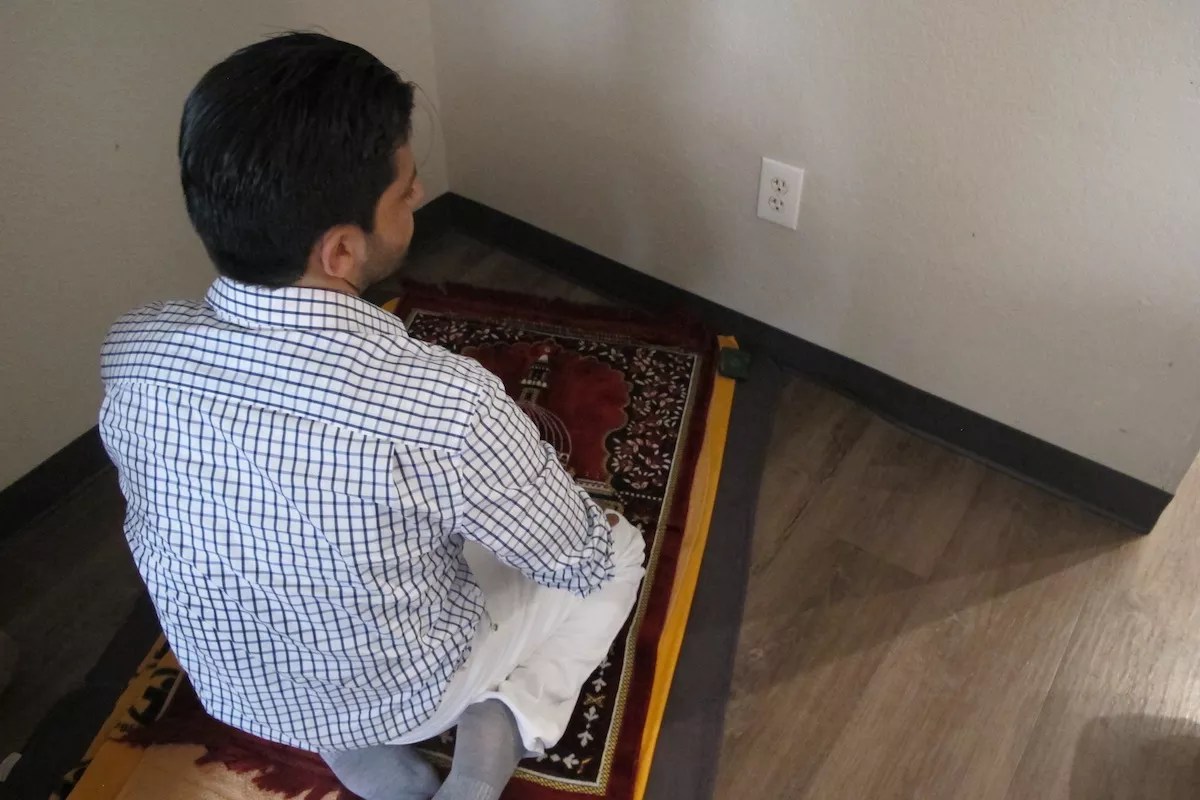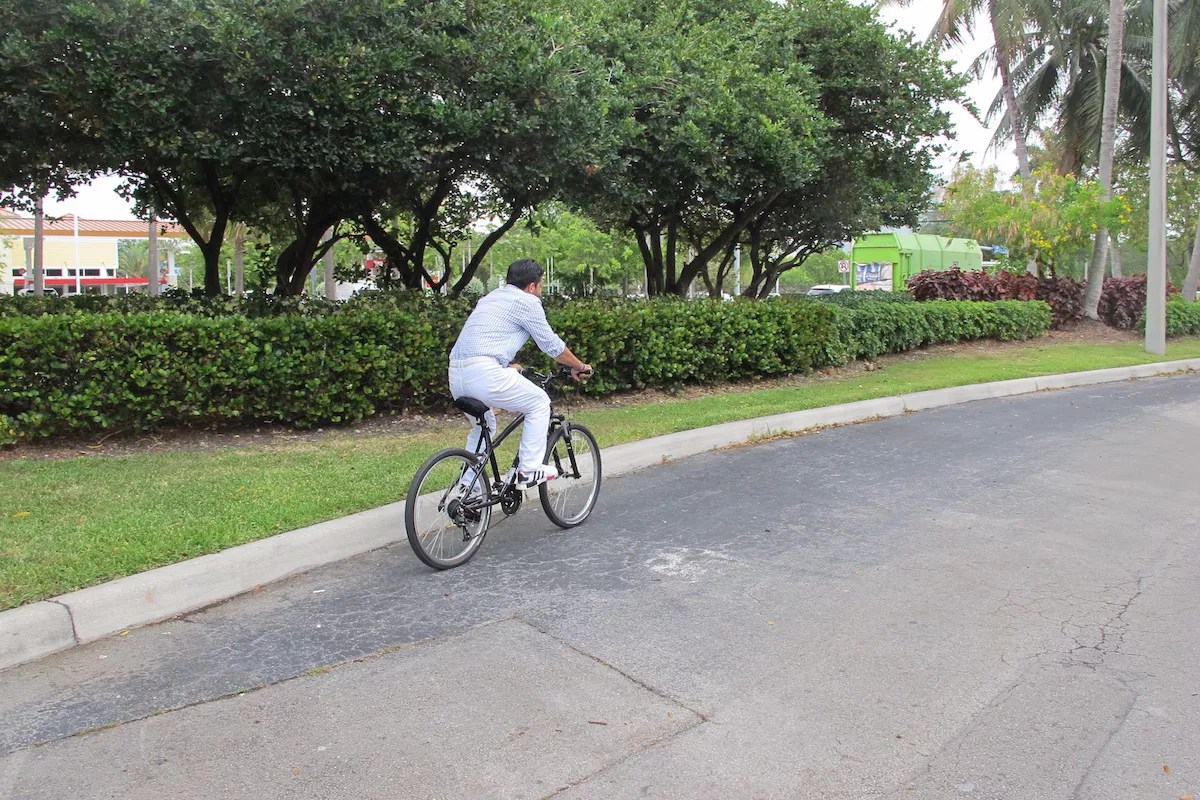
Photo by Joshua Ceballos

Audio By Carbonatix
On an afternoon in March, Hassani sat on his bed in an extended-stay hotel room in Doral, taking bites of bolani – a traditional Afghan stuffed flatbread – and sipping tea that he brewed for his guests. The room was filled with objects that attested to more than a short-term stay: a stove with teapots, a work desk with photos, a bicycle near the door, and a prayer mat.
Hassani was recently relocated to Little Havana, but he spent his first four months in the U.S. in Doral with about 80 fellow refugees who’d escaped Afghanistan after the Taliban seized control last year. In all, more than 600 Afghan refugees have been brought to South Florida since October of 2021. Some have moved on to states that are home to existing Afghan communities, but those who stayed have been quietly trying to make a life for themselves in Miami, where hardly anyone speaks their language or shares their culture. Those like Hassani, and his friend Karimi, still fear for their families back home and ask to be identified only by their last names for fear that the Taliban will identify them and harm their loved ones.
With the onset of war in Ukraine, the world has largely turned its attention to the plight of Ukrainians and support for the inevitable wave of evacuees from that country, while Afghans who fled violent conflict have been forgotten.
“We are worried about our future,” Hassani laments. “What will happen after our two-year visas are up? Will they send us somewhere else? We don’t know what will happen.”
These are Miami’s forgotten refugees, who came to South Florida to escape persecution and build a new life like so many others have in the past, and are now struggling to adapt to a place with a crushing housing market, sparse pedestrian infrastructure, and little to no cultural community aside from what they can build themselves.

Footage from August 2021 shows Afghans sprinting along the tarmac in an apparent attempt to prevent a U.S. military aircraft from taking off without them.
NBC News screenshot via YouTube
The American Pullout From Afghanistan
In his first year in office, President Biden announced a full removal of U.S. forces from Afghanistan after two decades of military activity in the region. As U.S. troops pulled out in the fall, the Taliban seized American weaponry and equipment and captured the capital city of Kabul.
Afghan people who had assisted U.S. forces – like 29-year-old Hassani, who worked as an interpreter because he learned English in Pakistan – feared for their lives as the Taliban sought retribution against locals who’d aided the U.S.
“I didn’t know working with Americans carried this much risk. The Taliban said that anyone who catches a translator would be paid $40,000,” Hassani tells New Times. “I felt hopeless. I thought that if I stepped outside my house, they would cut my neck.”
When a group of neighbors said they were heading to Kabul International Airport on August 18, 2021, to try to board a flight to head stateside, Hassani’s mother encouraged him to leave with his sister and see if they could secure a way out.
When they arrived at the airport, droves of civilians were gathered there, desperate to leave the country. Hassani recalls the footage that made national headlines: Afghan people running after U.S. military planes, clutching onto the wings in hope of leaving with them.
“We were really scared, because at any time we were expecting a suicide bombing. That was something that was happening regularly,” Hassani says.
After waiting for more than two hours, Hassani was able to speak to an American soldier and tell him he and his group had Special Immigrant Visas (SIV), and the soldier ushered them to a plane. Hassani wasn’t sure he’d make it this far, so he neglected to bring a phone charger or properly say goodbye to his mother before he was on a flight to a U.S. military base in Germany.
For two months, Hassani and his sister hopped from base to base, hurrying up and waiting as the U.S. government scrambled to find homes for thousands of refugees. As of this month, the U.S. has resettled more than 72,000 Afghan nationals through Operation Allies Welcome, a Department of State (DOS) spokesperson tells New Times via email.
“[The refugees] had genuine confusion as to why they were in Florida,” says Bobuq Sayed, a Miami-based writer and artist and volunteer interpreter for the local nonprofit Refugee Assistance Alliance. “There are no Afghans settled here, and no infrastructure for poor people or people who don’t have cars.”
When the refugees are brought over to U.S. soil, DOS works with nonprofit agencies to find suitable places to resettle them and help them start a new life. A DOS spokesperson tells New Times that where refugees are resettled depends on a variety of factors, including existing U.S. ties and the capacity of resettlement-agency affiliates in a given state.
Jamie Scotti Everett, director of operations for Refugee Assistance Alliance, tells New Times that the U.S.’ capacity to help refugees has been on the decline since 2016 and the advent of the Trump administration.
“For the past five administrations, the average cap for refugees entering the U.S. has been about 100,000 refugees allowed annually. The Trump administration slashed that number to historic lows, down to [under] 20,000,” Everett says.
“Every app and everywhere there’s a global outpouring of support for Ukraine, which I didn’t see happening with Afghanistan.”
During Trump’s presidency, resettlement agencies also lost a lot of their funding and the number of agencies and offices operating in each state significantly diminished. The Biden administration has put funding toward resettlement in states like Florida, where Everett says one resettlement agency – Church World Service – has been largely operating alone for the past few years. Now, more agencies have applied to assist refugees in Florida, but that process takes time that’s hard to come by amid an international crisis.
“The resources were decimated during the Trump years and all of a sudden we have this huge emergency,” Everett says.
For organizations like Church World Service and Refugee Assistance Alliance, helping the Afghan refugees has been a full-time job since they began arriving in October and the work hasn’t stopped. But for much of Miami and the world, attention has shifted to the plight of other groups.
Bumper stickers, Facebook avatars, and the sides of residential buildings sport Ukrainian flags as Miamians show support for the European country currently under siege, while victims from Afghanistan have been all but forgotten.
“Every app and everywhere there’s a global outpouring of support for Ukraine, which I didn’t see happening with Afghanistan,” Sayed, who is of Afghan heritage, tells New Times. “The thought is that violence and displacement is endemic to the Middle East but not to white countries. It’s a race- and Islam-based narrative.”
Everett says there is an awareness among refugee assistance workers that there is a bias toward those who come from countries that share characteristics with the U.S. (such as Ukraine) versus those from Muslim countries like Afghanistan and other nations populated by people of color and/or non-Christian religions. But she nonetheless hopes Americans can see beyond the bias and volunteer to help.
“I think we have to be honest about the fact that it’s easier for people to empathize with people they relate to. We have to recognize that bias in ourselves and make sure we apply the same amount of care and compassion for refugees from everywhere, not just Ukraine,” she says.

Hassani rides his bike most places to get around, with no car, license, or insurance to speak of.
Photo by Joshua Ceballos
Miami Struggles
Hassani and his sister arrived in Miami in October of 2021. A local Muslim organization donated prayer mats and food items they were used to finding in their country but that are hard to come by in South Florida.
“They bring us pans for cooking, vegetables, and halal meat,” Hassani says, referring to meat that is permissible under Muslim food restrictions. “When you ask someone in Miami for halal, they don’t understand what you’re talking about.”
Refugees with small children, like Karimi, are given assistance in enrolling their kids in school and getting their paperwork in order. Karimi tells New Times it’s been difficult placing his young boys in school owing to immunization requirements, as the children’s vaccination histories aren’t accessible.
Everett says organizations like Refugee Assistance Alliance have to help families navigate everyday hurdles like the online student portal, and assisting with homework when the children’s parents don’t read or speak English fluently.
For four months, Hassani lived in the Doral hotel with other Afghan refugees while the agencies attempted to find them permanent housing. But with Miami’s housing crisis in a state of emergency, finding affordable rent is tough enough for U.S. citizens, much less refugees who’ve arrived with nothing more than the clothes on their backs and a hope and a prayer.
“I thought that if I stepped outside my house, they would cut my neck.”
Hassani and his sister were recently relocated to a two-bedroom apartment in Little Havana, where they’ll have their rent covered for the first few months. But then they’ll be on their own. Hassani says he’s happy to have somewhere to stay, but he’s unsure how he’ll pay for it once the burden of rent falls to him.
“As a refugee, you don’t have any credit or budget, and no one wants to rent to a refugee,” he says.
Finding work is difficult for the refugees in Miami – a multilingual city that doesn’t have many speakers of Pashto or Dari, Afghanistan’s most common languages. Miami’s lack of functional public transportation and pedestrian infrastructure is also a hurdle, as refugees must slog through the process of obtaining driver’s licenses and purchasing a car in order to be able to work.
“I heard from friends who are in homes saying they can’t find jobs because of lack of English, and lack of driver’s license. They cannot pass the driving lessons because it’s all in English. I’m worried about this,” Karimi says.
Through it all, Hassani and his friends have maintained a sense of optimism. They’re grateful for the opportunity to live in the U.S., out of harm’s way, and for the help they’ve received. Hassani has an appointment next month to complete his driving test, and his sister is taking English lessons. If they can find work in Miami, they’ll stay; otherwise they’ll move to Texas or California where they know other Afghans.
“Leaving everything behind is not an easy task,” Hassani says. “You face a lot of problems, but inshallah [if God wills it], hopefully it will get better soon.”